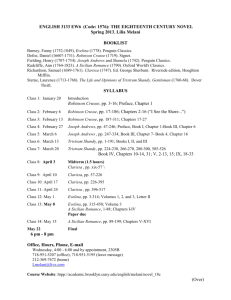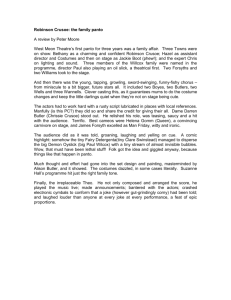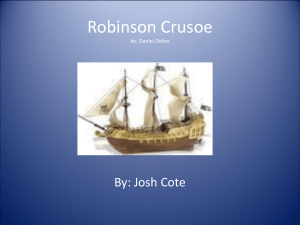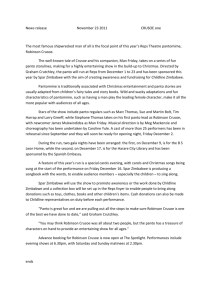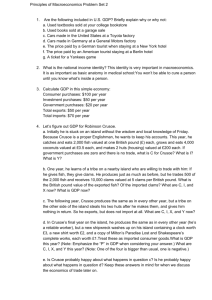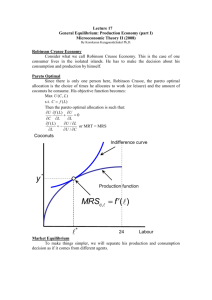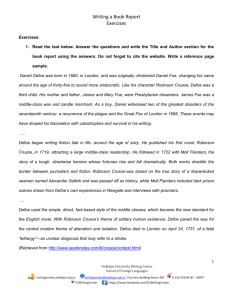ENGLISH 31.5: QUESTIONS FOR MIDTERM Defoe 11. For Walter
advertisement
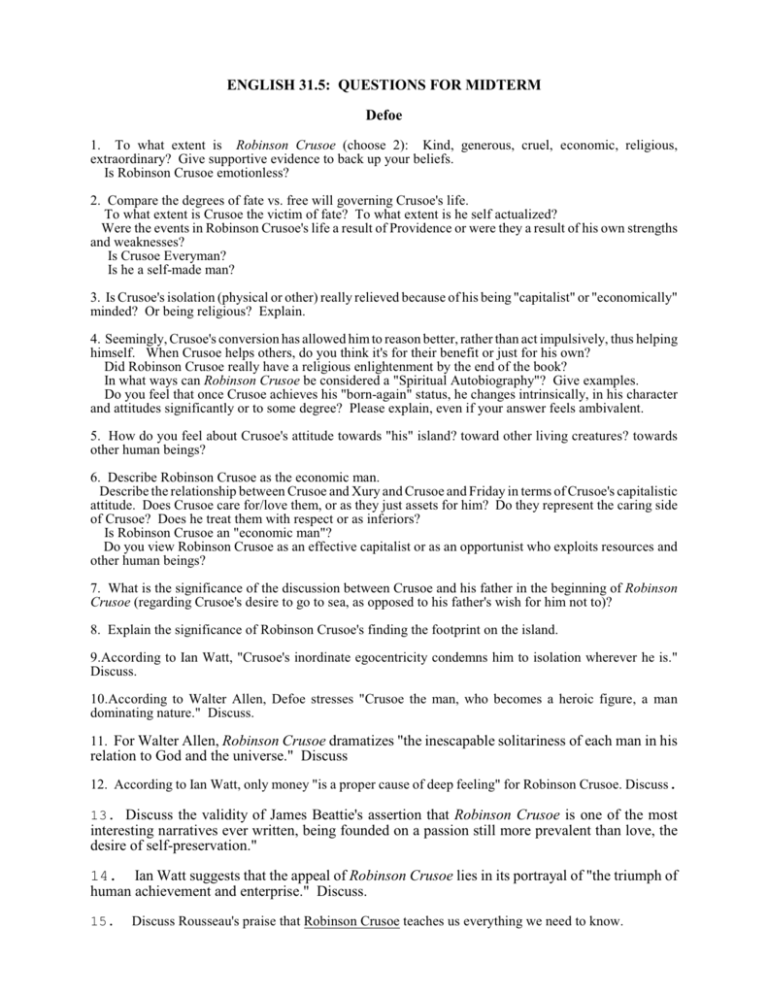
ENGLISH 31.5: QUESTIONS FOR MIDTERM Defoe 1. To what extent is Robinson Crusoe (choose 2): Kind, generous, cruel, economic, religious, extraordinary? Give supportive evidence to back up your beliefs. Is Robinson Crusoe emotionless? 2. Compare the degrees of fate vs. free will governing Crusoe's life. To what extent is Crusoe the victim of fate? To what extent is he self actualized? Were the events in Robinson Crusoe's life a result of Providence or were they a result of his own strengths and weaknesses? Is Crusoe Everyman? Is he a self-made man? 3. Is Crusoe's isolation (physical or other) really relieved because of his being "capitalist" or "economically" minded? Or being religious? Explain. 4. Seemingly, Crusoe's conversion has allowed him to reason better, rather than act impulsively, thus helping himself. When Crusoe helps others, do you think it's for their benefit or just for his own? Did Robinson Crusoe really have a religious enlightenment by the end of the book? In what ways can Robinson Crusoe be considered a "Spiritual Autobiography"? Give examples. Do you feel that once Crusoe achieves his "born-again" status, he changes intrinsically, in his character and attitudes significantly or to some degree? Please explain, even if your answer feels ambivalent. 5. How do you feel about Crusoe's attitude towards "his" island? toward other living creatures? towards other human beings? 6. Describe Robinson Crusoe as the economic man. Describe the relationship between Crusoe and Xury and Crusoe and Friday in terms of Crusoe's capitalistic attitude. Does Crusoe care for/love them, or as they just assets for him? Do they represent the caring side of Crusoe? Does he treat them with respect or as inferiors? Is Robinson Crusoe an "economic man"? Do you view Robinson Crusoe as an effective capitalist or as an opportunist who exploits resources and other human beings? 7. What is the significance of the discussion between Crusoe and his father in the beginning of Robinson Crusoe (regarding Crusoe's desire to go to sea, as opposed to his father's wish for him not to)? 8. Explain the significance of Robinson Crusoe's finding the footprint on the island. 9.According to Ian Watt, "Crusoe's inordinate egocentricity condemns him to isolation wherever he is." Discuss. 10.According to Walter Allen, Defoe stresses "Crusoe the man, who becomes a heroic figure, a man dominating nature." Discuss. 11. For Walter Allen, Robinson Crusoe dramatizes "the inescapable solitariness of each man in his relation to God and the universe." Discuss 12. According to Ian Watt, only money "is a proper cause of deep feeling" for Robinson Crusoe. Discuss. 13. Discuss the validity of James Beattie's assertion that Robinson Crusoe is one of the most interesting narratives ever written, being founded on a passion still more prevalent than love, the desire of self-preservation." 14. Ian Watt suggests that the appeal of Robinson Crusoe lies in its portrayal of "the triumph of human achievement and enterprise." Discuss. 15. Discuss Rousseau's praise that Robinson Crusoe teaches us everything we need to know. Fielding 1. Is Parson Adams a well-rounded character? Joseph Andrews? Fanny? Why or why not? Why is Parson Adams described as a character of many dimensions? Why is the novel called Joseph Andrews instead of Parson Adams? Who is the hero of Joseph Andrews? Adams has been called the heart of the novel. Discuss. 2. Give examples of how the concepts of charity and chastity are interwoven in Joseph Andrews. One of the themes in Joseph Andrews is charity. Name and describe three characters whom Abraham Adams considers charitable in nature. Does Parson Adams have a good, bad, or indifferent effect on people in everyday life? In what ways is Parson Adams genuinely charitable, where other characters are charitable when it suits or benefits them? What is the difference between Lady Booby's charity, Peter Pounce’s charity, and Parson Adams'? Discuss the issue or charity. Discuss the issue of dogma or faith versus "good works." 3. Fielding wrote: "I describe here not Men, but manners, not individuals, but a species." Considering this, does Fielding accomplish what he set out to do in his novel--change or improve mankind's manners? Does Fielding’s practice in writing the novel carry out his theory of the novel? 4. Parson Adams can be said to be the hero of the novel because we see him constantly setting good examples for everyone he meets. Which would the parson value most: Faith, good works, or both? 5. Do Joseph and Fanny represent passive innocence? 6. Explain the significance of Mr. Wilson's tale and the tale of Leonora and Horatio in Joseph Andrews. 7. What are some examples of hypocrisy and/or vanity in Joseph Andrews? 8. List some of the details in the beginning of Joseph Andrews and explain how they are insights or give a better understanding of events to come. 9. Describe the importance of fashion and list at least 5 characters and explain their fashion. 10. Choose a favorite character from Joseph Andrews (protagonist or antagonist) and elaborate on her or his "nature." Why do you enjoy the character? 11. Does the character of Joseph shift or evolve through the novel? 12. Discuss the issue of justice and the judicial system as portrayed in Joseph Andrews. How is society portrayed in Joseph Andrews? 13. Fielding wrote, “The only ways by which we can come at any knowledge of what passes in the minds of others are their words and actions.” Does his novel bear this idea out? 14. Is Joseph Andrews a novel of character or of adventure? 15. According to Spilka, "Fielding always tried to show that virtue can be a successful way of life." Discuss. 17. The merits of the country and the city were frequently debated during the eighteenth century. What does Fielding's opinion seem to be in Joseph Andrews? Fielding or Sterne 1. Ian Watt said, “through imaginative play we learn about ourselves.” Does this statement apply either to Joseph Andrews or to Tristram Shandy? Sterne 1. What makes Tristram Shandy unique? 2. After reading Tristram Shandy, are you hungry to read more of Sterne's works? Why or why not? 3. Is Parson Adams ultimately successful in his crusade towards goodness? 4. It has been said that this novel is disorganized, shifting, and downright confusing. Do you believe this is so or that the novel's form is "planned disorder," an attempt by Stern to reflect the chaos of everyday life? Is the chaotic plot of Tristram Shandy intentional? What is your personal response to Lawrence Sterne's version of "the structure of the novel"? 5. Why is Lawrence Sterne considered a modern writer for his time? In what ways does his concept of time help or hinder the progression of the novel? Is time an important factor in the story of Tristram Shandy? Why or why not? 6. In Tristram Shandy, the narrator says "...my work is digressive, and it is progressive too,--and at the same time." Explain this statement, using necessary examples. 7. How does the title The Life and Opinions of Tristram Shandy both apply and not apply to the novel? 8. As a 20th century reader, how do you react to the underlying bawdiness in Tristram Shandy? 9. Discuss how time is used in Tristram Shandy. 10. Benjamin Lehman asserts that Sterne's characters are "locked up in their own individualities.” Discuss. 11. E.M. Forster states, "Obviously a god is hidden in Tristram Shandy, and his name is Muddle." Discuss. Benjamin Lehman asserts that "a pervasive loneliness is at the core" of each of Sterne's characters. Discuss. 12. What quality or qualities make Stern seem particularly modern? 13. Discuss the significance of the title, The Life and Opinions of Tristram Shandy. 14. Howard Anderson characterizes Tristram Shandy as "a continuing series of events designed to show that life, and specifically other men and women defy human expectations." Discuss. 15. Is communication a problem for Sterne’s characters? communicate? If so, how do they manage to 16. Are cause and effect problematic in this novel? 17. Is Sterne successful in his effort to show the chaos of ordinary life? 18. Is Tristram Shandy a novel about writing and/or reading a novel?
